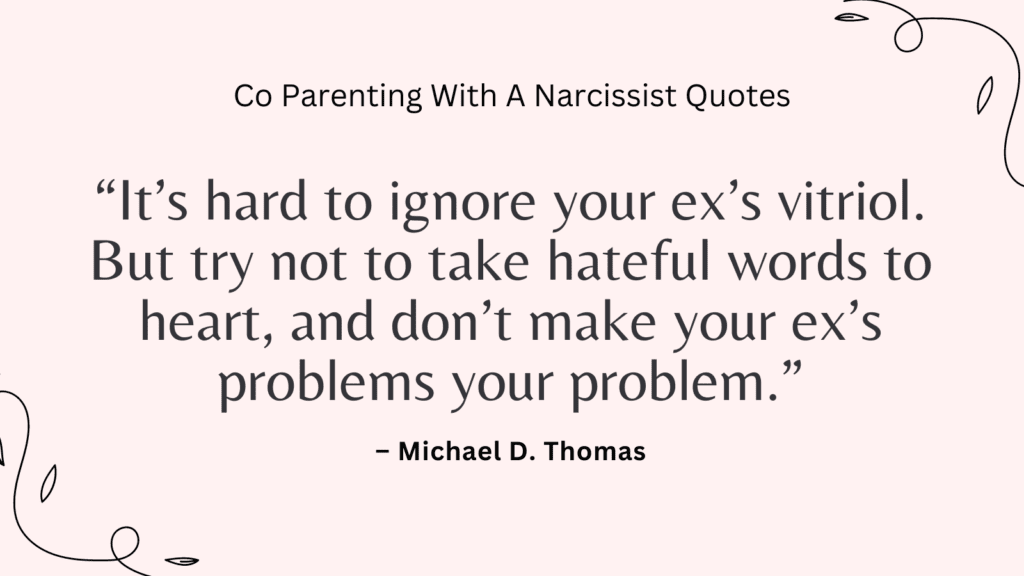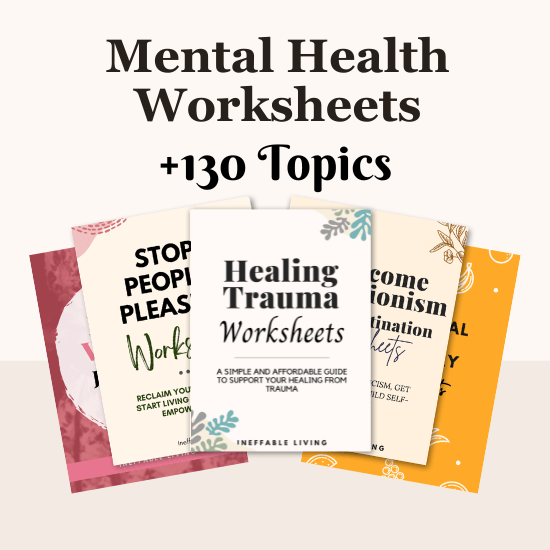This post contains some of the best co parenting with a narcissist quotes.
What Is Narcissism?
The word narcissism is often used too casually.
Many people believe that a narcissist is a selfish person.
However, selfishness alone does not make someone a narcissist.
One key characteristic of narcissism is lack of empathy.
The narcissist has little concern for others.
Co Parenting With A Narcissist Quotes
1. “In high-conflict divorces, some parents will sometimes accuse each other of being a “narcissist” or a “borderline.” Unless the person has been evaluated and definitively diagnosed by a qualified mental health professional, it’s more likely that the conflict revolves around behaviors that the other parent finds upsetting or simply doesn’t like.” – Ann Gold Buscho, Ph.D
2. “A big step toward achieving personal peace is accepting that your high-conflict co-parent may not change her ways.” – Michael D. Thomas
3. “Accept that your ex may never change. Then, if at some point your ex does become more cooperative, you’ll be happily surprised.” – Michael D. Thomas
4. “As a co-parent with a toxic ex, try to always respond to your child with compassion and empathy. This will allow you to maintain feelings of closeness even when you’re stressed and under duress—something that is especially important when your child falsely accuses you of some misdeed.” – Amy J. L. Baker, PhD & Paul R. Fine, LCSW
5. “As a co-parent with a toxic ex, you can help your child assume responsibility for her choices and help her develop the inner strength necessary to resist the pressure to choose one parent and reject the other. To foster responsibility in children is essential for parenting in general and for co-parenting with a toxic ex in particular.” – Amy J. L. Baker, PhD & Paul R. Fine, LCSW
6. “As a co-parent with a toxic ex, you have all the more reason to avoid resolving conflicts in a way that creates lingering bad feelings.” – Amy J. L. Baker, PhD & Paul R. Fine, LCSW
7. “As a co-parent, you know that you and your child will often spend time away from each other. As one with a toxic ex, you also know that your ex may behave in ways that make it difficult for you to connect with your child during those absences. Your task is to keep your connection with your child alive in ways that don’t rely on traditional means of communication, since those are likely to be thwarted.” – Amy J. L. Baker, PhD & Paul R. Fine, LCSW
Related: How To Get Revenge On A Narcissist? (In Relationships & At Work)
8. “Because children’s cell phones pose such a problem for co-parents with a toxic ex, they warrant special mention. We strongly suggest that, regardless of how much its use intrudes on your precious parenting time, you avoid confiscating your child’s cell phone.” – Amy J. L. Baker, PhD & Paul R. Fine, LCSW
9. “Cell phones and the Internet provide toxic co-parents with a means to insert themselves into their children’s experience of the other parent in “real time.” With text and instant messaging, your ex can be right there in the room commenting on your choices, like what you serve for lunch, and inflaming your child’s anger or resentment, encouraging him to see the worst in you.” – Amy J. L. Baker, PhD & Paul R. Fine, LCSW
10. “Commit to making your house and your parenting time a safe, peaceful haven for your child. Refuse to engage in arguments with your ex (either in person or on the phone) when your child is present. Keep conversations with your child centered on your child’s interest and well-being and other topics—not your ex’s negativity.” – Michael D. Thomas
11. “Co-parenting with a toxic ex means suffering many indignities and enduring many frustrating experiences; and because your child may at times appear to play an active role in your pain, you may need to forgive her for the ways in which she has and will hurt and frustrate you. You’ll need to cultivate the art of forgiveness under such circumstances, because it may not come easily or naturally” – Amy J. L. Baker, PhD & Paul R. Fine, LCSW
Related: Top 10 Narcissistic Relationship Patterns
12. “For your toxic ex, interfering with contact with your child can work hand in hand with poisonous messages about you. The way it works is this: First your ex exposes your child to messages that portray you as unsafe, unloving, and unavailable, planting seeds of doubt about your worth as a person and as a parent. Then your ex encroaches on your parenting time, so that you have fewer opportunities to show your child through shared time together that you are safe, loving, and available. (Telling your child that you love him is important, but showing him is even more important. You can’t convince someone of your love through words alone.) Furthermore, the less time you spend with your child, the fewer opportunities you have to share the small moments of his life with him.” – Amy J. L. Baker, PhD & Paul R. Fine, LCSW
13. “If you suspect that your ex is suffering from a mental illness or addiction to a substance, address specific problem behaviors as they relate to your children, without trying to diagnose. Mental illness or substance abuse does not automatically negate her right to parent, so contact an attorney or your local family court to learn how to proceed. While co-parents shouldn’t invest themselves in trying to diagnose their exes, understanding more about addiction or specific illnesses could be useful.” – Michael D. Thomas
14. “If your ex is bad-mouthing you and convincing your child that you’re a bad parent and damaged person, then you’re coparenting with a toxic ex. If so, you have an ex who finds fault with every aspect of your personality and conveys disdain to your child through his words, attitudes, and actions.” – Amy J. L. Baker, PhD & Paul R. Fine, LCSW
Related: Am I Being Gaslighted Quiz (& How To Recover From Gaslighting In 10 Steps)
15. “If your ex persists in violating the parenting plan at the expense of your child’s well-being, arguing about it has probably gotten you nowhere. Rather than remain in active conflict about it, document the details of the violations with dates, times, and other pertinent information, including your attempts to work with your ex and your ex’s responses.” – Michael D. Thomas
16. “In extreme cases, a toxic co-parent may lure a child into requesting a change in custody. For example, “If you live with me, I’ll have enough money to buy you a horse.” Or “If you really loved me, you would stay with me instead of visiting your (father/mother).” Some co-parents believe that the court is unlikely to enforce parenting plans for children who are older or children who are particularly adamant about refusing visitation. It’s true that family courts don’t always punish co-parents for failing to follow court orders.” – Amy J. L. Baker, PhD & Paul R. Fine, LCSW
17. “In high-conflict divorces, accusations of addiction, abuse, or mental illness often come up in custody battles. Sometimes these claims are true, and sometimes they are manipulative to get more custody time.” – Ann Gold Buscho, Ph.D
18. “Inside every alienated child is a child who feels rejected. This is an essential insight. Whenever your child who’s caught up in a loyalty conflict cruelly rejects you, know that he’s actually feeling rejected by you. This is what, in part, fuels the intense feelings of hostility and anger that your child expresses. Your child has been tricked into believing that you don’t love him. The reason that your child has come to believe this is because your toxic ex has manipulated him to misinterpret and overreact to your normal imperfections and flaws. Your ex may also have lied and misled your child into believing things that are entirely false.” – Amy J. L. Baker, PhD & Paul R. Fine, LCSW
Related: 21 Stages of a Narcissist Relationship (+FREE Breakup Recovery Worksheets)
19. “It’s hard to ignore your ex’s vitriol. But try not to take hateful words to heart, and don’t make your ex’s problems your problem. There’s a saying: what other people think about you is none of your business.” – Michael D. Thomas
20. “No matter what, your job as a co-parent with a toxic ex is to be present with your child, setting aside your worries for another time and trying to find ways to be engaged in even the most tedious of tasks. The key is to practice the following mindful parenting techniques, which involve keeping your attention focused on the here and now and being emotionally present in all your interactions with your child.” – Amy J. L. Baker, PhD & Paul R. Fine, LCSW
21. “Parenting is not an absolute right, but parents do have an absolute responsibility to act in their children’s best interest. When mental health or other issues hinder a parent’s ability to do so, parenting time may be contingent upon attending anger management classes, completing a rehabilitation program, or fulfilling other conditions.” – Michael D. Thomas
22. “Parents often hope that getting custody will give them sufficient power to overcome the uncooperative behavior of the co-parent. It may, however, put you at more risk for uncooperative behavior. The co-parent’s perception that you have more than your fair share of power can create resentment that energizes the co-parent to go to greater lengths to undermine your authority.” – Kathleen Bird, JD
23. “Refuse to respond to negative comments from your ex. Model for your child how to be the “bigger” person. Your child may ask you about the other parent’s bad-mouthing. You can tell her that while it is wrong and hurtful to say such things, the most important thing to you is taking care of her and spending time with her. Reassure her that she, rather than your ex’s words, is your focus. If the other parent’s bad-mouthing is a source of stress and concern for your child, seek the help of a family counselor.” – Michael D. Thomas
Related: 8 Stages Of Healing After Narcissistic Abuse (+FREE Breakup Recovery Worksheets)
24. “Remind yourself every day of things that make you feel grateful. Even when you’re really suffering, you can find solace in a sense of gratitude. Time with your child is surely something to be grateful for, especially if you have a toxic ex, although it may be challenging to feel grateful when your child is behaving rudely and disrespectfully.” – Amy J. L. Baker, PhD & Paul R. Fine, LCSW
25. “Some co-parents’ parenting time is supervised or otherwise conditional because of mental health, substance abuse, or domestic violence issues. Despite these issues, they may still be able to exercise parental rights and their children may still desire a relationship with them. That said, co-parenting should never put a child or parent in harm’s way.” – Michael D. Thomas
26. “Taking an uncooperative co-parent to court has its attractions. Imagine someone with authority telling the co-parent what to do, even imposing sanctions, while you sit placidly on the sidelines; then you leave the courthouse, problem solved! Few parents who go through a contested proceeding, however, see any lasting dramatic difference in the level of cooperation from the co-parent afterwards. More likely, the parenting relationship degenerates because of the adversarial nature of litigation and new resentments incurred.” – Kathleen Bird, JD
27. “There are many reasons why our children don’t turn out the way we hoped that they would. The malicious intrusion of a toxic ex is just one. Regardless of the past, unless you have a time machine, the only version of your child that you have the opportunity to have a relationship with is the one in front of you. We only walk down this path of life once, and in that sense we must play the hand we’re dealt, no matter how frustrating and saddening that may be.” – Amy J. L. Baker, PhD & Paul R. Fine, LCSW
Related: Top 5 Reasons Why Narcissists Target Empaths – & How to Starve The Narcissist of Supply
28. “When interacting with your child, try your hardest to always be safe, loving, and available. As a co-parent with a toxic ex, you don’t have the luxury of being a mediocre parent. You need to spend time engaging in meaningful interactions with your child. You need to invest yourself, your time, and your attention in the relationship to cultivate a deep and abiding bond that will be less susceptible to your ex’s interference and attempts to undermine your authority.” – Amy J. L. Baker, PhD & Paul R. Fine, LCSW
29. “When you’ve tried to communicate and cooperate with your ex to no avail, or when substance abuse, mental illness, or domestic violence is a factor in your co-parenting situation, you may feel powerless to protect your children from the emotional distress and other consequences related to your ex’s behavior.” – Michael D. Thomas
30. “While the idea of parental alienation as a “syndrome” is controversial, undeniably some co-parents manipulate their children in order to undermine their relationship with the other parent.” – Michael D. Thomas
31. “With poisonous messages, it’s not just what’s said but how it’s said that matters. Some toxic co-parents display strong emotions and are able to convey conviction and believability when making these kinds of statements, appearing sincerely distraught over the other parent’s flaws. Children who are exposed to these dramatic displays of emotion may come to believe the content of the messages and conclude that the other parent really is unfit and unworthy.” – Amy J. L. Baker, PhD & Paul R. Fine, LCSW
32. “You can become more effective in handling an uncooperative co-parent right now by using what is already in your own control . . . YOU. Your thoughts, your words and actions, when used strategically and effectively, have the power to change interactions with the co-parent for the better. You have the power to take the steps that can make this happen.” – Kathleen Bird, JD
33. “You can use a positive and mindful parenting philosophy to strengthen your relationship with your child and limit your ex’s negative influence. As a coparent with a toxic ex, you don’t have the luxury of parenting in a reflexive, automatic manner. Try to be mindful of your parenting choices and approach your child—even one who’s caught up in a loyalty conflict—with love, respect, and compassion.” – Amy J. L. Baker, PhD & Paul R. Fine, LCSW
Related: How to NOT Raise a Narcissist? 7 Surefire Ways to Prevent Narcissism In A Child
If you believe you or your child to be in danger, seek immediate assistance from local law enforcement or call the National Domestic Violence hotline at 1-800-799-SAFE (7233) or TTY 1-800-787-3224 or text “START” to 88788.

FAQ
How can co-parenting with a narcissist affect the children?
Co-parenting with a narcissist can have significant negative effects on children.
The narcissistic parent may engage in manipulative behaviors, use the children as pawns, or undermine the other parent’s authority.
This can lead to confusion, emotional distress, and loyalty conflicts for the children, which may impact their self-esteem and overall well-being.
How can one navigate co-parenting with a narcissistic ex-spouse?
Navigating co-parenting with a narcissist requires careful strategies to protect the children’s emotional well-being.
It’s essential to establish boundaries, communicate through written channels to minimize manipulation, and involve a neutral third party, such as a mediator or therapist, if necessary.
Prioritizing the children’s needs, maintaining consistency, and avoiding engaging in power struggles can also be helpful.
Related: Children’s Bill Of Rights In Divorce (+Top 7 Tips On How To Make Divorce Easier On Children)
Is it possible to co-parent successfully with a narcissist?
Co-parenting successfully with a narcissist can be challenging but not impossible.
It requires setting clear boundaries, utilizing effective communication techniques, and seeking support from professionals such as therapists or counselors.
In some cases, parallel parenting may be a more suitable approach, which involves minimizing direct contact and allowing each parent to have separate responsibilities and decision-making within their time with the children.
Can a narcissistic parent change their behavior for the sake of co-parenting?
While it is possible for individuals with narcissistic traits or tendencies to change, it can be challenging for a narcissistic parent to do so.
Genuine self-awareness, willingness to seek therapy or counseling, and personal growth are essential factors for change.
However, it is crucial to acknowledge that not all narcissistic parents are willing or able to change their behavior.
Related: Stages Of Divorce Grief (+Best 17 Tips On How To Grieve Your Divorce Even When You Still Love Him)



